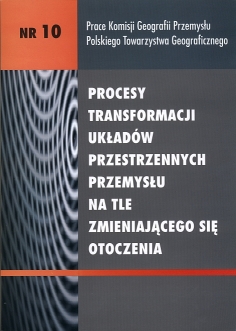The industrial area of Szczecinek and Lębork in regional structure of the Pomorskie and Zachodniopomorskie Voivodeships
DOI:
https://doi.org/10.24917/20801653.10.3Keywords:
Szczecinek, Lębork, przemysł, regionAbstract
During the years of economic transformation there have been changes in regional industrial structures, which are strictly connected with the modification of meaning and overestimation of the role of elements decisive in choosing the location of some social-economic functions. The article presents the structure’s characteristics of workers in the cities of Pomorskie and Zachodniopomorskie Voivodeships, with particular consideration of mid-cities. The sampler of differential workers’ displacements in the industrial section pointed at diverse maintenance of cities in the years 1995-2003. It was noted that 40% of entities are characterized by lower than cities-average dynamism of the increase in the workers’ participation in the industrial section. The lowest values were reached by small cities. This group includes also two largest cities of the littoral regions, i.e. Gdańsk and Szczecin, and 7 entities from the group of cities with 20-50 thousand inhabitants, located on the coast (Świnoujście and Kołobrzeg) and in the zone of influence of the Tricity agglomeration. The cities of all sizes were showing higher dynamics than the average, but especially those concentrated in the south part of the Pomorskie and Zachodniopomorskie Voivodeships. Mid-cities were characterized by three types of maintenance: increase, stagnation and decrease in the amount of workers in the industrial section, as a result of structural modification as well as the size of several work-markets, for which the liquidation or new location of one factory may implicate prominent changes in the structure of population. Therefore two cases have been elaborated in the subsequent section of the article: the first is Szczecinek, as a city with an increasing amount of workers, and the second is Lębork, where the index of industrial workers was increasing, and where during the period of time from 1995 to 2003 the number of people working in that field finally decreased.Downloads
Metrics
References
Chmielewski R., Trojanek M., 1999, Czynniki określające konkurencyjność układów przestrzennych (regionów i miast), [w:] R. Domański (red.), Podstawy gospodarczej polityki miasta. Studium Poznania – część II, Biuletyn KPZK PAN, z. 187, Warszawa, s. 59–77.
Czarnik A. (red.), 1971, Dzieje ziemi szczecineckiej, Poznań.Geografia gospodarcza Polski, 2004, pod red. I. Fierli, Warszawa.
Jerczyński M., 1973, Studia nad strukturą funkcjonalną miast, „Prace Geograficzne” 97, IGPAN.
Kołodziejski J., 1999, Nowa rola Poznania w procesie przekształceń polskiej przestrzeni, [w:] R. Domański (red.), Podstawy gospodarczej polityki miasta. Studium Poznania – część II, Biuletyn KPZK PAN, z. 187, Warszawa, s. 95–108.
Lindmajer J., Machura T., (red.), 1982, Dzieje Lęborka, Poznań.
Runge J., 1992, Wybrane zagadnienia analizy przestrzennej w badaniach geograficznych, Katowice.
Rydz E., 1998, Przekształcenia struktur funkcjonalno-przestrzennych w regionach nadmorskich, Studia Geograficzne, 69, Uniwersytet Wrocławski, Wrocław, s. 195–213.
Rydz E., 2001, Miasta regionów nadmorskich w okresie transformacji systemowej, Zeszyty Naukowe, 5, Instytut Kształcenia Managerów, Zachodniopomorska Szkoła Businessu, Kołobrzeg, s. 5–20.
Swianiewicz P., Dziemianowicz W., 2001, Atrakcyjność inwestycyjna miast powiatowych, Instytut Badań nad Gospodarką Rynkową, Warszawa, http://gdansk.ibngr.edu.pl/news/konfera1.htm
Zdrojewski E.Z., 1971, Rozwój przemysłu w latach 1945–1968, [w:] A. Czarnik (red.), Dzieje ziemi szczecineckiej, Poznań, s. 214–222.
Zioło Z., 1996, Przemiany struktur regionalnych w procesie transformacji systemu gospodarowania,Acta Universitatis Wratislaviensis nr 1814, Studia Geograficzne LXV, Wrocław, s. 89–97.
Downloads
Published
How to Cite
Issue
Section
License
Articles are published under the terms of the Creative Commons License (CC BY-ND 4.0; Attribution– NoDerivs).

